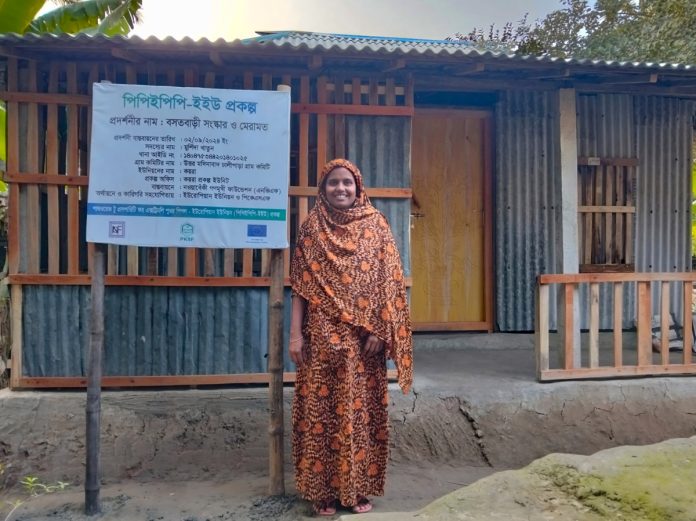Extremely poor people in coastal areas are the most vulnerable to climate-induced shocks, such as cyclones, tidal surges, and flooding that affect their homesteads and farmland. Every year, many suffer unbearable losses due to natural disasters and climatic hazards. They lose their homes, livestock, sources of income and other belongings to tidal waves or strong cyclonic storms. Unfortunately, these communities are unable to take precautions or prepare to mitigate these losses in their own capacity.
While many of the project’s extremely poor members’ houses are severely threatened by natural disasters, some have been heavily damaged or lost to recent catastrophic events such as cyclones Remal, Mocha, Yaas and Amphan. PPEPP-EU extends life-saving support to these members by helping them build resilient dwellings to protect their lives and livelihoods and reduce their losses in a disaster.
The project supports raising homestead plinths and undertaking necessary repairs to protect the homes of its vulnerable members against natural calamities. To date, PPEPP-EU has elevated plinths and repaired the homes of 178 members from the north, south, haor and ethnic regions that were either damaged or destroyed by natural disasters or deemed vulnerable for living.
Murshida Khatun (30) is one of those members of Khulna’s Koyra Union who lost her home in a devastating cyclone Remal. A strong wind blew during the storm, hurling her fragile hut into a nearby canal in the blink of an eye. Suddenly, Murshida’s family, including her husband, two daughters, and elderly father-in-law, found themselves under the open sky, though they remained safe by the grace of the Almighty.
They took shelter in a neighbour’s front yard and endured an inhumane life, grappling with food and well-being. Murshida approached the Union Parishad Chairman and requested that they build her a new home but received no response. Meanwhile, “My supposedly short stay in the neighbour’s house already lasted two months, and I was under pressure to leave from there,” shared Murshida.
She explained her situation to the Prosperity Village Committee (PVC), of which she is a member, and with the committee’s consent, received a grant from PPEPP-EU to rebuild her house. Along with the grant, she contributed some of her savings and purchased essential materials for the repairs, including cement poles, tin, bamboo, framing wood, nails and a signboard.
“Thanks to your (PPEPP-EU project) assistance, I have built a new house and future. Now, I am planning to take a loan from the project to start a new livelihood,” said Murshida, smiling in front of her new house.


